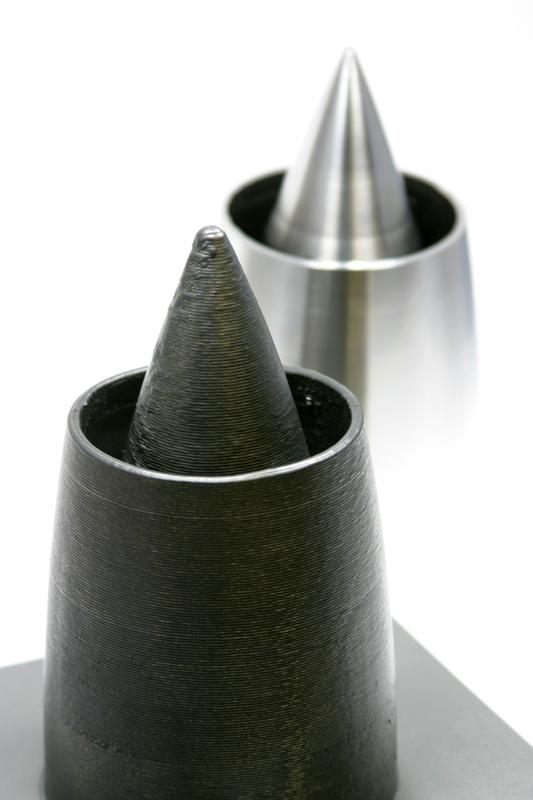Fraunhofer IWS Dresden collaborates with a strong research partner in Singapore

Laser wire build-up of an expansion nozzle Photo: Fraunhofer IWS Dresden
SIMTech is a research institute under Singapore’s Agency for Science, Technology and Research (A*STAR). The collaboration between Fraunhofer IWS and SIMTech started last year following Prof. Christoph Leyens, director and business unit manager Additive Manufacturing of the Fraunhofer IWS in Dresden, visit to SIMTech under its fellowship scheme.
“With the signing of this memorandum of understanding, our collaboration will reach the next level of intensity” says Prof. Leyens, “For us, the collaboration with a world-leading institute in Singapore opens up new horizons in the important fields of additive manufacturing and coatings technology, both from a scientific and an application-oriented perspective.”
As a leading aerospace hub in the Asia-Pacific region, Singapore offers a huge market potential for these technologies. SIMTech also has strong links to industry through the A*STAR Aerospace Programme and partnerships with companies in the precision engi-neering, transportation, oil & gas, energy and electronics sectors.
Fraunhofer IWS itself is a world leading-research institute in laser materials processing, surface and coatings technology; its mission is to support industry with innovative engineering solutions. “SIMTech’s collaboration with Fraunhofer IWS will enable us to accelerate the transfer from research to commercialisation, as well as to develop partnerships with industry players, in Singapore and around the world.”, says Dr. Jun Wei, programme manager at SIMTech.
Over the last few years Fraunhofer IWS has established a major research focus on additive manufacturing of metals, ceramics and polymers using various AM processes. The spectrum of applications ranges, among others, from aviation, space, medicine, energy, automotive, mechanical engineering and tool making. In collaboration with the TU Dresden, Fraunhofer IWS is running a unique innovation center for additive manufacturing.
Diamond-like carbon coatings are already being widely used in industry. Hydrogen-free DLC-coatings show an even better performance. The coatings are fabricated using the unique laser-arc PVD technology developed at Fraunhofer IWS. “Our coatings are significantly harder and exhibit substantially improved frictional properties relative to state-of-the-art coating solutions”, says Prof. Andreas Leson, business unit manager PVD- and Nanotechnology at Fraunhofer IWS.
“Since friction and wear occur virtually everywhere, the interest in our innovative coatings is enormous”. The success story of the coatings development was awarded with the prestigious Joseph von Fraunhofer Prize.
Contact and further information:
Fraunhofer-Institut für Werkstoff- und Strahltechnik IWS Dresden
01277 Dresden, Winterbergstr. 28
Prof. Christoph Leyens
Phone: +49 351 83391-3242
Fax: +49 351 83391-3300
E-Mail: christoph.leyens@iws.fraunhofer.de
Press and Public Relations
Dipl.-Ing. Virginie Garten
Phone: +49 351 83391-3336
Fax: +49 351 83391-3300
E-Mail: virginie.garten@iws.fraunhofer.de
Internet:
http://www.iws.fraunhofer.de and
http://www.iws.fraunhofer.de/en/pressandmedia/press_releases.html
http://www.iws.fraunhofer.de/en/centers/additive_manufacturing.html
Media Contact
All latest news from the category: Machine Engineering
Machine engineering is one of Germany’s key industries. The importance of this segment has led to the creation of new university degree programs in fields such as production and logistics, process engineering, vehicle/automotive engineering, production engineering and aerospace engineering among others.
innovations-report offers informative reports and articles covering technologies such as automation, motion, power train, energy, conveyor, plastics, lightweight construction, logistics/warehousing, measurement systems, machine tools and control engineering.
Newest articles

NASA: Mystery of life’s handedness deepens
The mystery of why life uses molecules with specific orientations has deepened with a NASA-funded discovery that RNA — a key molecule thought to have potentially held the instructions for…

What are the effects of historic lithium mining on water quality?
Study reveals low levels of common contaminants but high levels of other elements in waters associated with an abandoned lithium mine. Lithium ore and mining waste from a historic lithium…

Quantum-inspired design boosts efficiency of heat-to-electricity conversion
Rice engineers take unconventional route to improving thermophotovoltaic systems. Researchers at Rice University have found a new way to improve a key element of thermophotovoltaic (TPV) systems, which convert heat…



